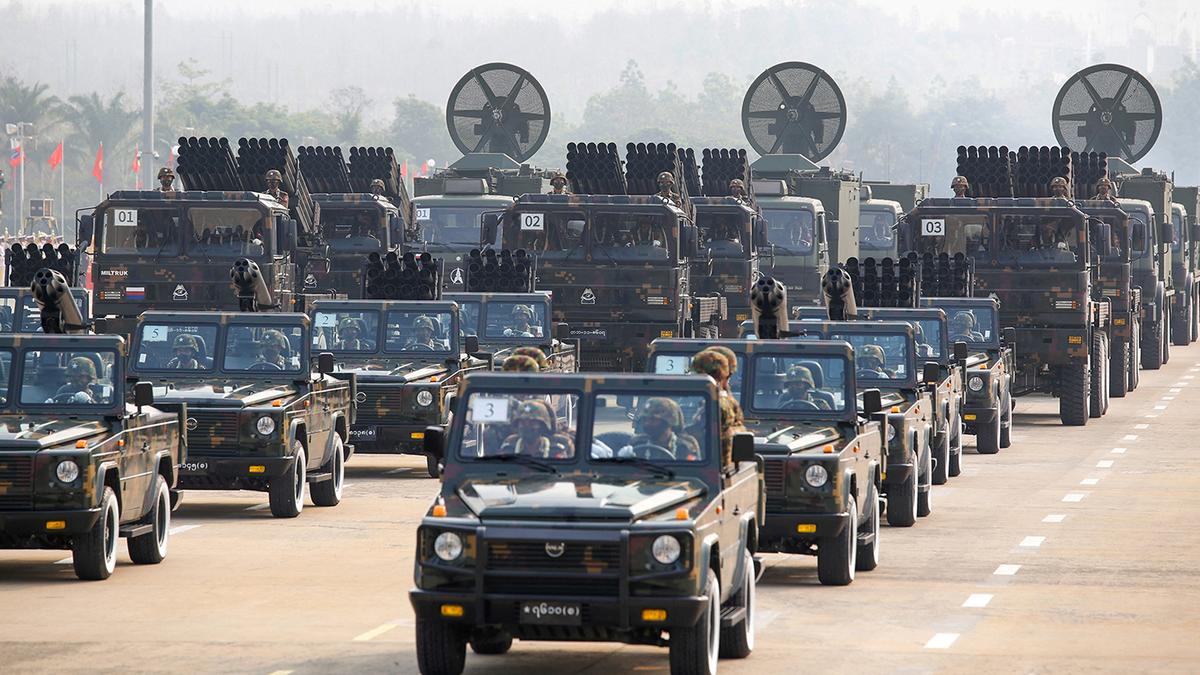Estelle knew she had to flee Myanmar. The military junta had just announced it would introduce conscription to bolster its forces against myriad armed groups challenging its power, and she was terrified she would be forced to fight.
The former government worker, whose name has been changed to protect her identity, is among thousands of people who have decided to leave their homes since the mandatory military service law was announced in February, and then came into effect in April.
Some people have risked their lives to trek through jungles and ford rivers, crossing into neighbouring countries without documentation because the military has made it increasingly difficult to leave through formal channels.
Others have fled to areas under the control of armed groups fighting against the military, or have joined these groups themselves.
The mass exodus is taking place as the military regime faces its most serious crisis since it took power in a 2021 coup, which sparked widespread protests.
The street demonstrations, which were met with a brutal crackdown, morphed into an armed resistance movement that has seen newer anti-coup forces join with many of Myanmar’s autonomy-seeking ethnic armed groups, posing the most significant challenge to the military in decades.
The UN Human Rights Office says more than 5,000 people have been killed by the military since the coup, including more than 1,000 women. Around 3 million people have been displaced.
Estelle had to sneak out of the country because she had joined a countrywide Civil Disobedience Movement after the coup and faced international travel restrictions as a result.
She and a friend paid the equivalent of around $280 each in Myanmar’s kyat currency to travel by car from the city of Mawlamyine to the border with Thailand and then hired a smuggler to take them across the Moei River.
“It was just the two of us girls travelling with a man we didn’t know,” Estelle said. “We were scared we would be arrested or trafficked.”

Worth the risk
But they took the risk anyway despite the fact that, at 36, Estelle falls outside the age range for conscription. A few days after its initial announcement, the junta also pledged to exempt women for the time being.
But Estelle is not going back.
“That’s just words,” she said. “We never know when the time will come when they will make difficulties for us.”
The junta has been accused by Western governments of systematic atrocities and excessive use of air strikes and artillery in civilian areas. It has dismissed that as misinformation and says it is targeting “terrorists”.
In a report published in July, the UN Special Rapporteur on the situation of human rights in Myanmar, Tom Andrews, said women’s rights organisations had identified increasing reports of the trafficking of women and girls following the enactment of the conscription law.
“Women are using dangerous channels to flee the country amid fears of conscription, putting them at high risk of trafficking and other forms of exploitation. Conscription exemptions for married women also raise the risk of early and forced marriage for girls and women,” Mr. Andrews wrote.

Severe hardships
The military call-up comes on top of an economic crisis that has sent the currency spiralling lower and caused unemployment to surge. The World Bank says women have been particularly hard hit by the economic downturn that followed the COVID-19 pandemic and the coup.
“There is no safe place for women and girls … they have to survive in risky situations,” she said.
Women were at the forefront of resistance to the 2021 coup and have also joined armed groups fighting the military. Around one-fifth of the 20,000 political prisoners in Myanmar are female, according to a local rights group.
Women from the Rohingya, a mostly Muslim minority from Myanmar’s Rakhine State, have also faced fresh hardships after years of abuses.
Although Rohingya are not eligible for conscription under the law because they are denied citizenship, the military has conscripted more than 1,000 Rohingya men and boys since February using methods including abduction, threats and false promises of citizenship, according to a Human Rights Watch report.
And this has had an effect on women and the economic welfare of their households.
“Families are worried … Women don’t want their husbands to go,” said Sofia, a Rohingya women’s protection specialist in Rakhine State, who also used a pseudonym for security reasons.
The International Organization for Migration in Thailand said it had seen a steady increase in people crossing the border from Myanmar, including a nearly 30% increase between January and February. Women were more likely than men to enter without official documentation, it added.
But it’s not just military conscription that some women have to fear.
In the eastern Shan State, at least three ethnic armed groups have announced mandatory service policies in recent months. Two of these groups conscript women.
Fear of being conscripted into an ethnic armed group drove 16-year-old Christine, who also did not give her real name for security reasons, from her home in Lashio township in February after one of the armed groups there told her grandmother that Christine and her siblings would have to serve in its forces. They fled the next day and Christine headed to Malaysia.
She is now in Kuala Lumpur where she is terrified of being arrested by immigration officials.

